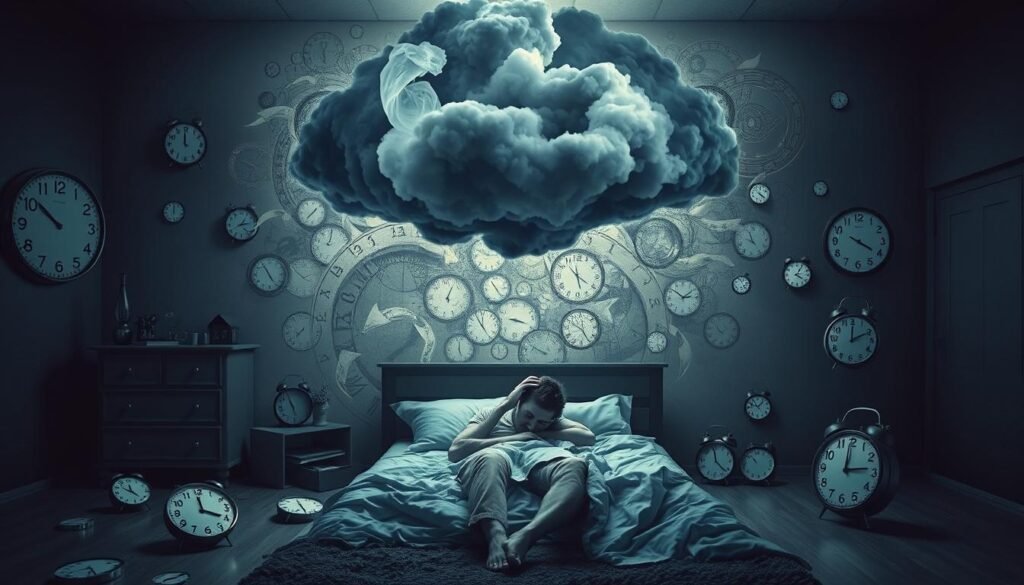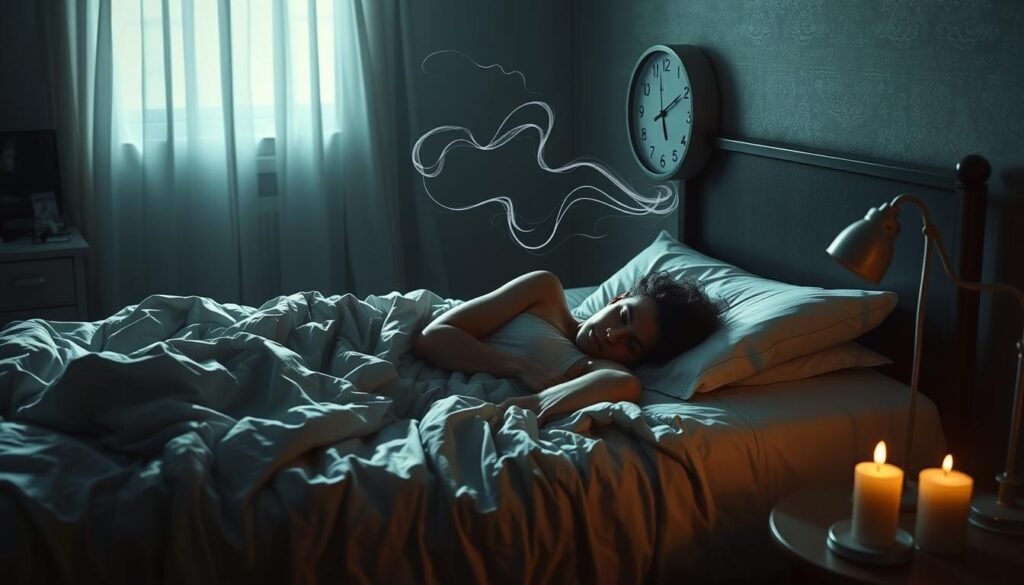The National Health Interview Survey by the Centers for Disease Control and Prevention shows a big difference. Women report feeling tired more often than men. This highlights how common anxiety-induced fatigue is. Many people suffer from mental and physical exhaustion due to anxiety. This problem can be hard to notice in our busy lives.
It’s important to know the symptoms of anxiety fatigue. This knowledge helps us understand how it changes our energy and everyday activities. In this article, we look at the mental fatigue that comes with anxiety. We’ll offer insights and stress why it’s vital to spot these signs early.
Key Takeaways
- Anxiety fatigue affects both emotional and physical well-being.
- Women are more likely to report feeling fatigued due to anxiety compared to men.
- Understanding symptoms can lead to better management of anxiety-induced fatigue.
- Chronic anxiety can lead to debilitating tiredness and lack of motivation.
- Identifying signs early can lead to effective coping strategies.
Understanding Anxiety and Its Effects on the Body
Anxiety often causes many physical problems. When we feel stressed or threatened, our body prepares to fight or flee. It releases stress hormones like adrenaline and cortisol. These effects of anxiety can make our hearts beat faster, muscles tense up, and even lead to feeling nauseous. As a result, we might feel more anxious and tired. This can start a hard-to-break cycle of ongoing fatigue.
Long-term anxiety can disrupt both our bodies and minds. Being exposed to stress hormones for a long time can weaken our immune system. This makes us more likely to get sick with things like colds and flu. Mental stress can make us feel worn out, impacting our daily lives and health. Common signs include breathing quickly and lightly, heart rate changes, and stomach issues like nausea and diarrhea.
About 3% of American adults suffer from generalized anxiety disorder (GAD). Anxiety disorders are the most common mental health issues in the United States, affecting about 31% of adults at some point. These disorders may come from traumatic events or ongoing stress at work or home. Knowing what happens in the body can help address anxiety-related fatigue. There are treatments like medication, therapy, and changing our lifestyle. These can help control symptoms and reduce mental exhaustion. For more details on how anxiety affects the body, you can check out this resource.
What Causes Anxiety-Induced Fatigue?
Anxiety makes you feel tired for many reasons. One reason is chronic hyperarousal. This means your body is always alert. Being on edge all the time uses up a lot of energy. So, you end up feeling drained both mentally and physically.
This tiredness is also caused by always worrying. Worrying a lot can make you feel emotionally exhausted. This makes doing everyday things harder. Anxiety can mess up your sleep too. Bad sleep makes it hard for your body to feel rested, making the tiredness worse.
It’s important to deal with this kind of tiredness. Knowing what makes you feel so tired can help you find ways to cope. Even though anxiety is tough, there are ways to manage it. For helpful information on dealing with anxiety, check this source.

Symptoms of Anxiety Fatigue
Anxiety fatigue shows symptoms that greatly affect day-to-day life. Knowing these symptoms is key to handle anxiety quickly and well. People with anxiety fatigue often face these physical, mental, and emotional signs.
Physical Symptoms
Anxiety fatigue’s physical signs lead to feeling very tired. Common symptoms are:
- Headaches
- Muscle tension
- Chronic tiredness
- Palpitations
- Dizziness
These physical signs may lead to discomfort. They make daily tasks harder to do.
Mental Fatigue Symptoms
Mental fatigue affects thinking, making it hard to focus. Common mental symptoms are:
- Lack of focus
- Irritability
- Restlessness
- Difficulty making decisions
- Memory issues
Stress often makes these mental symptoms worse. This leads to less productivity and more frustration.
Signs of Exhaustion Anxiety
Exhaustion anxiety shows through constant worry and fear. Key signs include:
- Constant overthinking
- Difficulty with everyday tasks
- Social withdrawal
- Sleep disturbances
- Feelings of hopelessness
Knowing these signs is the first step towards seeking help. It helps in finding ways to cope better.
| Type of Symptom | Examples |
|---|---|
| Physical Symptoms | Headaches, Muscle tension, Chronic tiredness |
| Mental Fatigue Symptoms | Lack of focus, Irritability, Restlessness |
| Signs of Exhaustion Anxiety | Constant overthinking, Difficulty with tasks, Sleep disturbances |
Being aware of these symptoms is critical for early action. It opens doors to lifestyle improvements and treatment choices.
How Anxiety Impacts Sleep Quality
Anxiety significantly affects how well we sleep. It often leads to insomnia or restless nights. People with anxiety may have trouble falling asleep. Or they might wake up a lot because of their worries. The link between anxiety effects on sleep is clear. Many suffering from anxiety find it hard to get restful sleep.
Studies show that 24% to 36% of insomniacs also have anxiety disorders. And, 27% to 42% of people with anxiety may have hypersomnia. This creates a cycle. Poor sleep makes anxiety worse. In turn, this leads to more sleep issues. Disorders like Generalized Anxiety Disorder (GAD) and PTSD see sleep troubles as a main symptom.
Normal sleep has two main parts: Non-Rapid Eye Movement (NREM) and Rapid Eye Movement (REM) sleep. Our brains work in complex ways to manage these cycles. Anxiety can keep us from reaching deep, healing sleep. This means less time in REM and deep sleep phases. Not getting enough restorative sleep can make us more tired and stressed. This can increase our anxiety.
It’s crucial for those with anxiety to maintain a good sleep routine. This can greatly reduce the anxiety effects on sleep. And it can improve our overall health. Setting a regular bedtime and creating a calming space for sleep helps. These steps are key for better sleep and lessening anxiety-related tiredness.
| Type of Sleep | Characteristics | Impact of Anxiety |
|---|---|---|
| NREM Sleep | Stage where most restorative sleep occurs. | May be disrupted, leading to fatigue and cognitive impairment. |
| REM Sleep | Stage associated with dreaming and emotional processing. | Reduced time spent can worsen anxiety symptoms. |
| Overall Sleep Quality | Refers to how restful and restorative sleep feels. | Low quality can lead to heightened anxiety and emotional regulation issues. |

This link between sleep and anxiety is vital. Focusing on sleep can help manage anxiety. Getting professional advice can also offer coping methods. It helps with both sleep and anxiety problems. For details, check out Sleep Foundation.
The Connection Between Anxiety and Tiredness
Anxiety and tiredness often feed into each other, creating a hard-to-break cycle. It’s important to know how chronic alertness and emotional wear-out contribute to this. Understanding these can help manage energy and improve well-being.
Chronic Hyperarousal
Chronic hyperarousal means always being on high alert. This state uses up a lot of energy over time. It comes from anxiety and can lead to feeling tired. People in this state might feel worn out even if they rest enough.
Anxiety can cause muscles to be tense all day, making tiredness worse. Though short naps under 20 minutes can help a bit, they don’t address the main issue.
Emotional Exhaustion
Emotional exhaustion is feeling drained because of long-term anxiety. Those who experience it may lose motivation and joy in things they once loved. As anxiety gets worse, they might feel a sense of doom and struggle to focus.
To deal with severe stress, people might nap more. But this leads to a cycle. Bad sleep at night means more naps during the day, linking anxiety and ongoing tiredness even more.

Identifying Anxiety Burnout Symptoms
Anxiety burnout is a growing concern for many. It leads to severe mental exhaustion symptoms. People often feel overwhelmed and constantly tired. It’s important to spot these signs early on.
Key symptoms of anxiety burnout include:
- Chronic fatigue that rest doesn’t fix
- Feeling disconnected from one’s environment or daily tasks
- Hard time focusing or staying on task
- Becoming more irritable or having mood swings
- Experiencing headaches or getting sick often
Knowing these symptoms early helps in dealing with them. If stress continues for too long, these signs get worse. Those feeling very tired or unmotivated should talk to a doctor.
Understanding the medical codes linked to fatigue is useful. It helps doctors choose the right treatment. You can learn more about diagnosis here.
To improve emotional health, try to reduce anxiety and burnout. Support from friends, relaxation techniques, and focusing on mental health help in recovery.
Long-Term Effects of Chronic Anxiety
Chronic anxiety has big effects on both the mind and body. It leads to a cycle of ongoing distress. Knowing the long-term effects is key to understanding why managing anxiety is important.
Impact on Mental Health
Chronic anxiety greatly affects mental health. It increases the risk of mood problems, like depression. It also causes trouble with memory and making decisions.
When anxiety stays high for a long time, it’s hard to do well in daily life.
- Cognitive decline and memory impairment
- Increased risk of mood disorders
- Difficulty in concentrating
- Reduction in overall emotional well-being
Physical Health Deterioration
Anxiety can hurt physical health in many bad ways. It can cause heart problems, stomach troubles, and muscle tightness. Being stressed and anxious a lot can raise blood pressure, increase the risk of strokes, and lead to chronic fatigue, which means feeling tired all the time no matter how much you rest.
| Health Impact | Description |
|---|---|
| Heart Disease | Increased risk due to prolonged stress response. |
| Digestive Issues | Common problem reported by individuals with chronic anxiety. |
| Muscle Tension | Frequent experience among those under persistent stress. |
| Chronic Fatigue | Persistent tiredness unrelated to rest, linked to chronic anxiety. |
The effects of long-term anxiety make it more important to manage stress. Doing so helps reduce the impact on both mental and physical health.
Preventing and Managing Fatigue from Anxiety
To manage anxiety fatigue well, you need to be proactive. Working on better sleep habits is key. It helps improve your mental and physical health. By sleeping regularly, your mind and body rest well. This reduces the tiredness that comes with anxiety. Eating right and exercising regularly also boost your mood and energy.
Improving Sleep Hygiene
Good sleep is vital to avoid mental exhaustion from anxiety. Having a regular sleep schedule, with seven to eight hours of sleep, helps a lot. It leads to clearer thinking and better emotional balance. Here’s how to improve your sleep:
- Create a calming bedtime routine
- Avoid screens at least an hour before bed
- Keep the sleep environment dark and cool
- Limit caffeine and heavy meals in the evening
- Practice relaxation techniques like deep breathing or meditation
Diet and Exercise Tips
Living a healthy lifestyle is key to fighting anxiety-related fatigue. Eating right and exercising have proven benefits for your mood and energy. Here are some tips for diet and exercise:
- Consume a balanced diet rich in fruits, vegetables, whole grains, and lean proteins
- Stay hydrated by drinking plenty of water
- Engage in regular physical activity, aiming for at least 30 minutes most days of the week
- Incorporate stress-reducing practices like yoga or tai chi
- Be mindful of portion sizes and avoid emotional eating
When to Seek Professional Help
It’s important to know when to seek help for anxiety. This can lead to a better life. Nearly 30% of adults will face anxiety at some point. When anxiety starts affecting your daily life, relationships, or sleep, getting professional help for anxiety is crucial.
If you’ve been overly worried or restless for more than six months, it’s time to see a doctor. Signs you need expert help include:
- Having trouble focusing and making choices
- Feeling restless or on edge often
- Having panic attacks that disrupt your day
- Experiencing mood swings and getting easily irritated
- Seeing changes in your sleep, like not being able to sleep or sleeping too much
Anxiety can be treated, but you need the right help. Treatments like Cognitive Behavioral Therapy (CBT) and certain medicines can really help. For general anxiety, learning how to cope in therapy is key to getting better.
Often, people start feeling better after just five to eight therapy sessions. Knowing when to seek help shows you take your mental health seriously. The first step in getting better might be talking to friends, family, or a healthcare professional.
| Signs of Anxiety Needing Attention | Suggested Actions |
|---|---|
| Persistent worry for over six months | Schedule a consultation with a therapist |
| Frequent panic attacks | Seek immediate professional evaluation |
| Significant mood changes | Talk to your doctor about mental health options |
| Sleep disturbances | Discuss sleep patterns and treatments with a healthcare provider |
| Impact on relationships and daily life | Engage support systems and therapy |
Taking the step to when to seek help helps you take back control and manage anxiety better.
Conclusion
It’s vital to outline the main points about anxiety fatigue. This helps grasp its effect on our daily lives. Spotting the signs is key to managing it well. Symptoms can range from being really tired to feeling mentally worn out.
Dealing with anxiety fatigue can make life better. Better sleep habits, a good diet, and regular exercise help fight off this tiredness. If these symptoms keep up, getting help from a pro is crucial. They can tailor ways to cope just for you.
Knowing how anxiety and fatigue connect is super important. When we care for our mental health and know the signs, we can start improving. Getting to know yourself and taking steps to get better leads to a happier life.